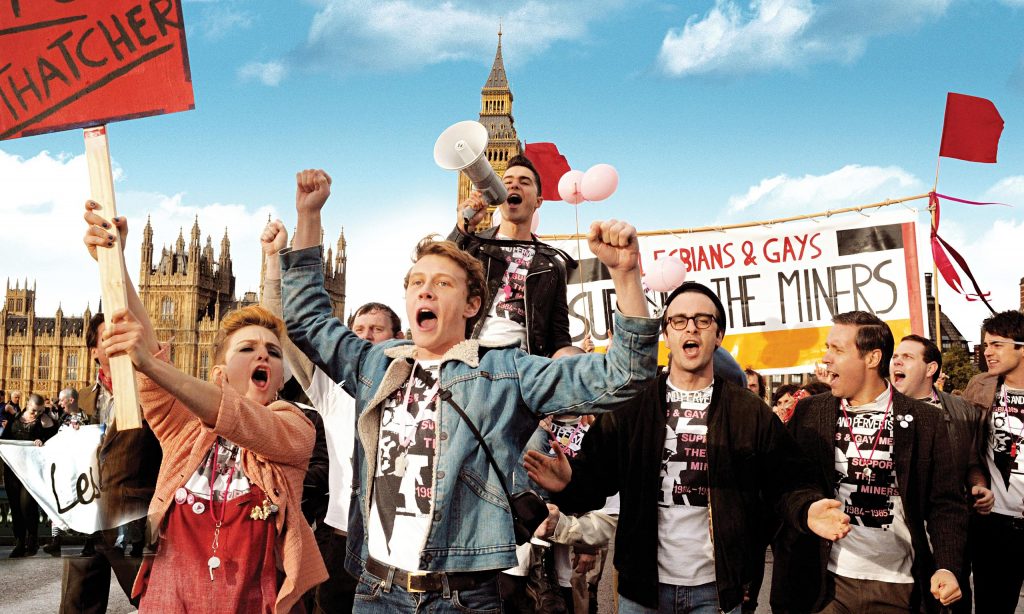30 years after the events it depicts, Pride is an inspiring film about the importance of solidarity and courage to fight for justice in our world
Pride (2014)
Directed by Matthew Warchus. Written by Matthew Warchus. Starring Ben Schnetzer, George MacKay, Joe Gilgun, Faye Marsay, Dominic West, Andrew Scott, Freddie Fox, Imelda Staunton, Jessica Gunning, Liz White, Bill Nighy, Lisa Palfrey, Paddy Considine, Rhodri Meilir, Sophie Evans, Karina Fernandez, Jessie Cave, Kyle Rees, Russell Tovey and Monica Dolan.
In March 1984, British miners went on a major lengthy strike as an attempt to prevent the shutdown of coal mines in the UK, and their action, ruled as illegal, was met with strong opposition by the government of Prime Minister Margaret Thatcher. It was then that a group of lesbian and gay activists in London decided to create a campaign called “Lesbians and Gays Support the Miners” in order to raise money for the families affected by the strike — a selfless move that showed the importance of solidarity when you’re up against a government that doesn’t care about minorities and only sees them as a burden in the way of their own interests.
Written by Stephen Beresford and directed by Tony Award-winning playwright Matthew Warchus, Pride chronicles the real-life efforts of Mark Ashton (Ben Schnetzer) and other gay rights activists who believed they should join hands with those in need to fight a common enemy, especially if the enemy in question is the government. Despite their good intentions, Mark and the others soon realize they must deal not only with the union’s refusal to accept their support but also the hostility of homophobic miners when they decide to bypass the union and go in person to a mining village in South Wales to give the donations directly to them.
Aware that gays and the miners are both harassed by the police, public and tabloid press, Mark sympathizes with the workers’ plight, even though it is understandable why most gays refuse to join his campaign out of resentment for the miners’ homophobia. Those who stay collect donations in buckets, risking to be beaten in the street, and when Mark addresses the miners for the first time, we can see how awful it must be to speak to a group of people who think of you as a pervert — especially when you have nothing to gain from helping them. “You’re the first gays I’ve ever met in my life,” a miner says to Mark, which he could be saying to an alien.
But if some people in the town react with hostility or intimidation towards Mark and his friends, others see them almost as a curious attraction, which leads to a series of hilarious moments — and if there’s something that Pride nails so well is its delicious sense of humor, rising mostly from the obvious cultural differences between these two very contrasting groups of people. This includes, for instance, a priceless scene in which an old lady wants to confirm a rumor about all lesbians being vegetarians, or a moment later on when the women of the miners’ town have a blast in a gay club in London among men in rubber.
Another highlight in Pride is the film’s nuanced characters, many of whom have their own personal conflicts. While Mark is portrayed as a good-hearted idealist that doesn’t want to give up easily and at a certain point begins to fear that he may be infected with HIV (the growing awareness about AIDS in the 1980s is also explored in the movie), the young (and fictional) student Joe “Bromley” (George MacKay) is still discovering his own homosexuality and sees this new experience as a personal liberation that he must hide from his conservative family.
Other interesting characters include the funny Steph (Faye Marsay), the cynical Jonathan (Dominic West), one of the very first men diagnosed as HIV positive, and his caring boyfriend Gethin (Andrew Scott), a Welsh man estranged from his religious mother. The movie also avoids making Bromley’s mother a caricature (she does have her reasons for trying to protect her son) or showing the widow Maureen (Lisa Paltrey) as a bitter one-dimensional villain, recognizing that, despite her actions, she is a respected and hard-working woman in her community.
With an awesome soundtrack full of British songs from the 1980s, including The Smiths, Queen, Dead or Alive and Yazoo, Pride is a refreshing film that understands how things are connected in our world, which is perfectly illustrated when Mark says to a gay journalist that “miners dig for coal, which produces power, which allows gay people like you to dance to Bananarama till 3 o’clock in the morning.” And if we care about other people’s problems like our own, there will certainly be people out there caring about ours too.





